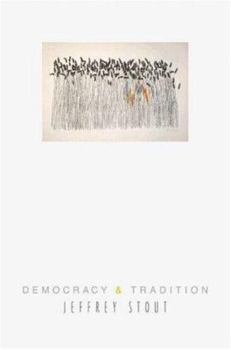Democracy and Tradition
Select Format
Select Condition 
Book Overview
Do religious arguments have a public role in the post-9/11 world? Can we hold democracy together despite fractures over moral issues? Are there moral limits on the struggle against terror? Asking how the citizens of modern democracy can reason with one another, this book carves out a controversial position between those who view religious voices as an anathema to democracy and those who believe democratic society is a moral wasteland because such voices are not heard. Drawing inspiration from Whitman, Dewey, and Ellison, Jeffrey Stout sketches the proper role of religious discourse in a democracy. He discusses the fate of virtue, the legacy of racism, the moral issues implicated in the war on terrorism, and the objectivity of ethical norms. Against those who see no place for religious reasoning in the democratic arena, Stout champions a space for religious voices. But against increasingly vocal antiliberal thinkers, he argues that modern democracy can provide a moral vision and has made possible such moral achievements as civil rights precisely because it allows a multitude of claims to be heard. Stout's distinctive pragmatism reconfigures the disputed area where religious thought, political theory, and philosophy meet. Charting a path beyond the current impasse between secular liberalism and the new traditionalism, Democracy and Tradition asks whether we have the moral strength to continue as a democratic people as it invigorates us to retrieve our democratic virtues from very real threats to their practice.
Format:Hardcover
Language:English
ISBN:0691102937
ISBN13:9780691102931
Release Date:October 2003
Publisher:Princeton University Press
Length:368 Pages
Weight:1.50 lbs.
Dimensions:1.1" x 6.0" x 9.3"
Customer Reviews
2 ratings
Dense but very rewarding pragmatist argument for the American democratic tradition
Published by Thriftbooks.com User , 18 years ago
Stout's closely-argued book argues in favor of a public sphere that includes the voices of religious people but resists efforts from Christian new traditionalists on one side and secularists on the other to reduce the conversation to a single foundation. His criticisms of MacIntyre and Hauerwas in the middle chapters are especially crucial, as those writers hold tremendous sway over certain mainline Protestants and Catholics. Stout successfully argues that it is best for Christianity to be involved in the democratic process. I did find the final chapters (8-12) very dense and tough going. Stout warns about this in the introduction, but I still feel like he could have unpacked some of the denser sections a little bit. I am not a professional philosopher, but I'm not entirely unsophisticated, either. I still felt completely lost at a few points. In these chapters, it's also difficult at times to see the connection to the larger argument. In the conclusion, the author wraps up the threads of the three parts into a beautiful, powerful argument in the tradition of American pragmatism for an enriched democracy that draws the allegiance, participation, and criticism of a broad, diverse citizenry. Very highly recommended.
The Tradition of Democracy
Published by Thriftbooks.com User , 20 years ago
Stout eloquently argues that Democracy itself, which is considered the antithesis of tradition by many, constitutes a tradition. He argues that within the history of the democratic tradition, as articulated by people like Emerson, Whitman, Dewey, and Ellison, is a set of virtues and vices that correspond to a democratic conception of character. Among the virtues it extols are piety, hope, and charity. He then forges a way between Rawls and Rorty on one side and MacIntyre and Hauerwas on the other. He vigoursly attacks Hauerwas and the other "new traditionalists" whom he says isolate themselves from the broader conversation in favor of sectarian pursuits. Finally, he articulates a way forward with ethics in a time of pluralism. Religious voices can express contasting justifiably held beliefs in common forum. Each should express their beliefs, support them with reasons, and then engage in immanent criticism of those in oposition. Steeped in pragmatism, Stout argues that ethics can be truthful without defining truth. Further, this can be done without metaphysics. What we are left with is a system that allows for truth claims, pluralism, and public debate. As a longtime reader of Hauerwas it is somewhat painful to give this book 5 stars, but it is well deserved. Although I still have reservations about the democratic project, Stout's book was insightful. Though I found his criticism of the new traditionalists a bit strong, it definately caused me to rethink some of my positions. In the end, if one is committed to democracy but finds ethical discourse challenging, this is the way to go.





